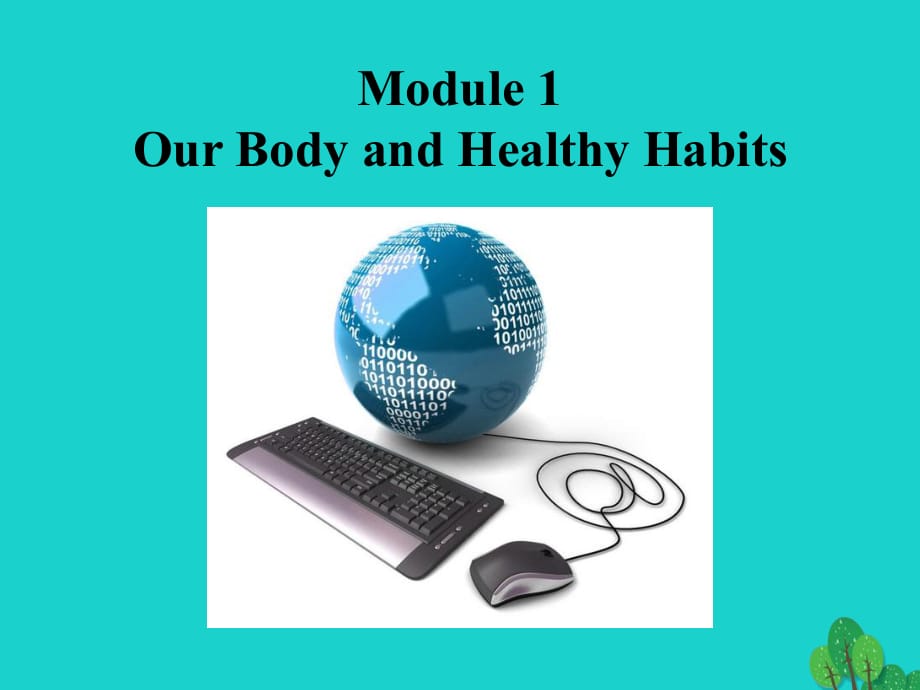《高中英語(yǔ) Module 1 Our Body and Healthy Habits 基礎(chǔ)知識(shí)課件 外研版必修2》由會(huì)員分享�,可在線(xiàn)閱讀,更多相關(guān)《高中英語(yǔ) Module 1 Our Body and Healthy Habits 基礎(chǔ)知識(shí)課件 外研版必修2(39頁(yè)珍藏版)》請(qǐng)?jiān)谘b配圖網(wǎng)上搜索��。
1�、Module 1Our Body and Healthy Habits 1be connected with 與有聯(lián)系;與有關(guān)系Which of them are connected with illness���?(P1)這些詞中哪些與疾病有關(guān)����? connect vt.連接�����;聯(lián)系�����;接通connect.with/to.把與聯(lián)系起來(lái)connection n連接����;聯(lián)系have (no)connection with與(沒(méi))有聯(lián)系in connection with關(guān)于;與有關(guān) The highway connects the two cities. 這條公路把這兩個(gè)城市連接了起來(lái)�����。The police
2�����、are questioning two men in connection with the robbery.警方正在審問(wèn)與搶劫案有關(guān)的兩個(gè)人�。Smoking has a close connection with cancer.吸煙與癌癥之間有密切的關(guān)系。 表示“與有關(guān)”的其他短語(yǔ):be concerned with���,be related to�,have something to do with��。 2at least 至少�����;最少I(mǎi) eat at least three portions of fruit and vegetables a day. (P1) 我每天至少吃三份水果和蔬菜����。 no
3�、t in the least 一點(diǎn)也不����;根本不at (the)most 最多;至多 “Would you mind if I put the television on����?” “No,not in the least.” “我開(kāi)電視機(jī)影響你嗎��?”“一點(diǎn)都不影響�。”I might earn 250 a night at (the) most. 一晚上我至多可掙250美元����。 3rarely adv.稀少地;極少地I rarely get toothache.(P1)我很少牙疼�����。 rare adj. 稀少的���;罕有的�;珍貴的 a rare plant/sight 罕有的植物/景象 a rare book
4���、/coin/stamp 珍奇的書(shū)/硬幣/郵票 rarely位于句首時(shí)��,句子要部分倒裝�,有類(lèi)似用法的否定副詞還有never��,little��,seldom�,hardly等。我很少聽(tīng)到這樣離奇的故事��。Rarely have I heard such a strange story.I have rarely heard such a strange story. 4fit adj.健康的��;勝任的Im quite fit.(P1)我相當(dāng)健康��。 be fit for適合�;勝任be fit to do適合做keep/stay fit保持健康It is fit for sb. to do sth./thatc
5、lause(某人)做是合適的fit vt.& vi.合身�,合適,安裝 The jacket fitted me pretty well but the trousers were too small.我穿這件上衣很合身��,但褲子太小了����。What kind of job is he fit for? 他適合什么樣的工作���?She is not fit to look after children.她不適合照看小孩。 fit/suit/matchfit作動(dòng)詞時(shí)���,意為“適合���,合身”,多用于衣服�、鞋、帽等��,指大小����、尺寸、形狀合適�,引申為“吻合,協(xié)調(diào)”�。既可用作及物動(dòng)詞,也可用作不及物動(dòng)詞��。fit還可作形容
6��、詞����,意為“健康的”�。 match多指大小��、顏色�、式樣、性質(zhì)等相一致�;匹配。suit常用作及物動(dòng)詞�,意為“適合��;適宜”�,主要指顏色、衣著�、發(fā)型、時(shí)間���、氣候���、式樣、口味�、條件、地位等合適某人��。用于比喻意義時(shí)多用suit。 他的新大衣穿著很合身�。His new coat fits him well.這個(gè)時(shí)間對(duì)你來(lái)說(shuō)合適嗎?Does the time suit you? 門(mén)被漆成了藍(lán)色����,為的是與墻的顏色相配。The doors were painted blue to match the walls. 5diet n飲食���,日常食物 vi.節(jié)食��;按醫(yī)生的規(guī)定飲食 Now write two more s
7����、entences about your diet or healthy habits. (P1) 現(xiàn)在再寫(xiě)出兩個(gè)關(guān)于你的飲食或健康習(xí)慣的句子�。 a balanced diet營(yíng)養(yǎng)均衡的飲食 go/be on a diet節(jié)食 It is important to have a balanced diet. 均衡的飲食很重要。I am too fat����,so I have to go on a diet.我太胖了,所以我不得不節(jié)食��。To keep fit�,you should diet and take more exercise.為了保持身體健康,你應(yīng)該節(jié)制飲食多做運(yùn)動(dòng)。 6anxious ad
8�、j.焦慮的;不安的�;渴望的Why is Zhou K ais mother anxious?(P2)周凱的媽媽為什么焦慮不安�����? be anxious about sth.為擔(dān)心(憂(yōu)慮)be anxious for sth.急于/渴望be anxious (for sb.)to do sth.渴望(某人)做be anxious thatclause 擔(dān)心anxiously adv.焦急地���;憂(yōu)慮地�����;渴望地 We are anxious for the news of your safe arrival.我們渴望得到你安全到達(dá)的消息。Tom is anxious to know what has h
9���、appened. 湯姆急于想知道出了什么事�。 7When Zhou K ais mother saw him heading towards the front door without a jacket on��,she eyed him anxiously. (P2)當(dāng)周凱的媽媽看見(jiàn)他沒(méi)穿夾克衫就朝門(mén)外走去時(shí)�,她擔(dān)心地盯著他。 句中saw him heading towards the front door 為“see賓語(yǔ)賓語(yǔ)補(bǔ)足語(yǔ)”結(jié)構(gòu)�。其中heading towards the front door為現(xiàn)在分詞短語(yǔ)作賓補(bǔ)。表示“看見(jiàn)某人正在做某事”。 I saw him talking wi
10��、th a foreigner.我看見(jiàn)他在和一個(gè)外國(guó)人交談�。I saw them arguing in the middle of the road.我看到他們正在馬路中間爭(zhēng)辯。 感官動(dòng)詞see�,hear,watch��,feel�,notice,observe 等后接“賓語(yǔ)賓補(bǔ)”時(shí)常見(jiàn)形式: 感官動(dòng)詞賓語(yǔ)do(不帶to的動(dòng)詞不定式)�,表示看到賓語(yǔ)做某事的全過(guò)程,賓語(yǔ)與不定式之間是主謂關(guān)系�。I heard her sing an English song just now.剛才我聽(tīng)見(jiàn)她唱了一首英文歌曲。 感官動(dòng)詞賓語(yǔ)doing�,表示看到賓語(yǔ)正在做某事,賓語(yǔ)與分詞之間為主謂關(guān)系�。I saw a plan
11、e flying to the north. 我看到一架飛機(jī)正朝北飛去�����。 感官動(dòng)詞賓語(yǔ)done�����,表示看到某事被做,賓語(yǔ)和分詞之間為動(dòng)賓關(guān)系�。There was a person who saw the man killed.有一個(gè)人目擊了那個(gè)男子被殺。 感官動(dòng)詞賓語(yǔ)done�,表示看到某事被做,賓語(yǔ)和分詞之間為動(dòng)賓關(guān)系��。There was a person who saw the man killed.有一個(gè)人目擊了那個(gè)男子被殺�。 【提示】若賓補(bǔ)是不帶to的不定式,在變成被動(dòng)語(yǔ)態(tài)時(shí)要加上不定式符號(hào)to����。有人看見(jiàn)他走進(jìn)餐館。Someone saw him go into the restauran
12��、t.He was seen to go into the restaurant. 8“OK�,OK .”Zhou K ai went and did as he was told.(P2)“好的,好的�,”周凱走了,按照媽媽說(shuō)得做了����。as在本句中引導(dǎo)方式狀語(yǔ)從句�,意為:按照。 When in Rome�,do as Romans do.入鄉(xiāng)隨俗。Youd better do as the teacher asks.你最好照老師說(shuō)的做。 9A lot of my school friends eat sweets every day but Im lucky because I dont have a
13�����、 sweet toothId rather eat a nice piece of fruit.(P3)我的很多朋友每天都吃甜食�����,我就非常幸運(yùn)��,因?yàn)槲也幌矚g吃甜食我更喜歡吃點(diǎn)水果���。句子would rather意為“寧可���,寧愿”后加動(dòng)詞原形。 I would rather stay at home on Sundays. 星期天我寧可待在家里����。To be honest,I would rather have a quiet night in front of the TV.老實(shí)說(shuō)��,晚上我寧愿安靜地看看電視�。 I would rather stay at home on Sundays. 星期天我
14、寧可待在家里�。To be honest����,I would rather have a quiet night in front of the TV.老實(shí)說(shuō)�,晚上我寧愿安靜地看看電視。 would rather (not) do sth.寧愿(不)做某事would rather do.than do. would do.rather than do.寧愿做而不愿做would rather sb.did sth.寧愿某人做某事(用一般過(guò)去時(shí)表示現(xiàn)在或?qū)?lái))would rather sb. had done sth.寧愿某人做過(guò)某事(用過(guò)去完成時(shí)表示過(guò)去的情況) I would rather go to a movie than watch TV at home.我寧愿去看電影而不愿待在家里看電視�。Shall I open the window?我開(kāi)一扇窗好嗎����?Id rather you didnt.你最好別開(kāi)。We would rather he had given the lecture last week.我們希望他上周就做了這個(gè)講座��。
 高中英語(yǔ) Module 1 Our Body and Healthy Habits 基礎(chǔ)知識(shí)課件 外研版必修2
高中英語(yǔ) Module 1 Our Body and Healthy Habits 基礎(chǔ)知識(shí)課件 外研版必修2

